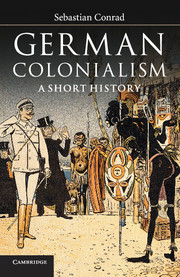Book contents
- Frontmatter
- Contents
- Illustrations
- Maps
- Acknowledgements
- Chapter 1 Introduction
- Chapter 2 Colonialism before the colonial empire
- Chapter 3 Pressure groups, motivations, attitudes
- Chapter 4 The German colonial empire
- Chapter 5 The colonial state
- Chapter 6 Economy and work
- Chapter 7 Colonial society
- Chapter 8 Knowledge and colonialism
- Chapter 9 The colonial metropole
- Chapter 10 Colonialism in Europe
- Chapter 11 German colonialism and its global contexts
- Chapter 12 Memory
- Chapter 13 Selected readings
- Index
- References
Chapter 11 - German colonialism and its global contexts
Published online by Cambridge University Press: 05 June 2014
- Frontmatter
- Contents
- Illustrations
- Maps
- Acknowledgements
- Chapter 1 Introduction
- Chapter 2 Colonialism before the colonial empire
- Chapter 3 Pressure groups, motivations, attitudes
- Chapter 4 The German colonial empire
- Chapter 5 The colonial state
- Chapter 6 Economy and work
- Chapter 7 Colonial society
- Chapter 8 Knowledge and colonialism
- Chapter 9 The colonial metropole
- Chapter 10 Colonialism in Europe
- Chapter 11 German colonialism and its global contexts
- Chapter 12 Memory
- Chapter 13 Selected readings
- Index
- References
Summary
The dynamics of German colonialism extended not only to Europe but also into the world, far beyond the ‘protectorates’ and overseas possessions. The formally acquired territorial colonial empire was not a separate sphere that can be understood in isolation from the increasing integration of the world – integration caused by capitalist structures, imperialist intervention, cultural exchange, and migratory flows. German colonial history was embedded in global events and linkages in many ways.
We can identify three different levels of global entanglement. Firstly, the imperialists’ expansionary plans often extended beyond the existing colonial territories; there was no shortage of visions of an enlarged empire. This fact is well established and is usually mentioned in traditional accounts of colonial history. There are many examples for these larger expansionary ambitions. Most prominent among them was the media campaign by nationalist groups hailing from the educated classes and organized in the Pan-German League, for Germany to seize western Morocco. While the government and industry favoured a liberal open door policy, nationalist circles claimed Morocco to be an ideal location for German settlement. These debates fed into the two Moroccan crises of 1905 and 1911, in which Germany attempted to employ gunboat diplomacy to limit France’s ambitions in the region, but ultimately failed and became increasingly diplomatically isolated. Another region of imperialist aspirations was central Africa, where protagonists of imperialism like Wilhelm Hübbe-Schleiden saw a ‘German India’ in the making. These proposals date from the early 1880s, but surfaced regularly in the following decades. The creation of Mittelafrika, centred on the Belgian Congo, was one of the official German objectives of the First World War. In public discussion, mainly on the nationalist fringe, a series of further territorial aims were put forward, among them in South Africa and in Latin America, in particular in Brazil.
- Type
- Chapter
- Information
- German ColonialismA Short History, pp. 169 - 185Publisher: Cambridge University PressPrint publication year: 2011

